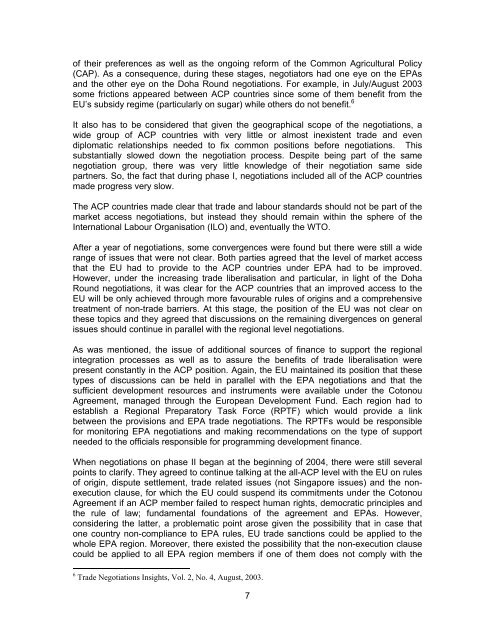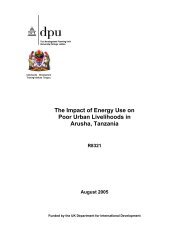EPA Review Annex Documents - DFID
EPA Review Annex Documents - DFID
EPA Review Annex Documents - DFID
You also want an ePaper? Increase the reach of your titles
YUMPU automatically turns print PDFs into web optimized ePapers that Google loves.
of their preferences as well as the ongoing reform of the Common Agricultural Policy<br />
(CAP). As a consequence, during these stages, negotiators had one eye on the <strong>EPA</strong>s<br />
and the other eye on the Doha Round negotiations. For example, in July/August 2003<br />
some frictions appeared between ACP countries since some of them benefit from the<br />
EU’s subsidy regime (particularly on sugar) while others do not benefit. 6<br />
It also has to be considered that given the geographical scope of the negotiations, a<br />
wide group of ACP countries with very little or almost inexistent trade and even<br />
diplomatic relationships needed to fix common positions before negotiations. This<br />
substantially slowed down the negotiation process. Despite being part of the same<br />
negotiation group, there was very little knowledge of their negotiation same side<br />
partners. So, the fact that during phase I, negotiations included all of the ACP countries<br />
made progress very slow.<br />
The ACP countries made clear that trade and labour standards should not be part of the<br />
market access negotiations, but instead they should remain within the sphere of the<br />
International Labour Organisation (ILO) and, eventually the WTO.<br />
After a year of negotiations, some convergences were found but there were still a wide<br />
range of issues that were not clear. Both parties agreed that the level of market access<br />
that the EU had to provide to the ACP countries under <strong>EPA</strong> had to be improved.<br />
However, under the increasing trade liberalisation and particular, in light of the Doha<br />
Round negotiations, it was clear for the ACP countries that an improved access to the<br />
EU will be only achieved through more favourable rules of origins and a comprehensive<br />
treatment of non-trade barriers. At this stage, the position of the EU was not clear on<br />
these topics and they agreed that discussions on the remaining divergences on general<br />
issues should continue in parallel with the regional level negotiations.<br />
As was mentioned, the issue of additional sources of finance to support the regional<br />
integration processes as well as to assure the benefits of trade liberalisation were<br />
present constantly in the ACP position. Again, the EU maintained its position that these<br />
types of discussions can be held in parallel with the <strong>EPA</strong> negotiations and that the<br />
sufficient development resources and instruments were available under the Cotonou<br />
Agreement, managed through the European Development Fund. Each region had to<br />
establish a Regional Preparatory Task Force (RPTF) which would provide a link<br />
between the provisions and <strong>EPA</strong> trade negotiations. The RPTFs would be responsible<br />
for monitoring <strong>EPA</strong> negotiations and making recommendations on the type of support<br />
needed to the officials responsible for programming development finance.<br />
When negotiations on phase II began at the beginning of 2004, there were still several<br />
points to clarify. They agreed to continue talking at the all-ACP level with the EU on rules<br />
of origin, dispute settlement, trade related issues (not Singapore issues) and the nonexecution<br />
clause, for which the EU could suspend its commitments under the Cotonou<br />
Agreement if an ACP member failed to respect human rights, democratic principles and<br />
the rule of law; fundamental foundations of the agreement and <strong>EPA</strong>s. However,<br />
considering the latter, a problematic point arose given the possibility that in case that<br />
one country non-compliance to <strong>EPA</strong> rules, EU trade sanctions could be applied to the<br />
whole <strong>EPA</strong> region. Moreover, there existed the possibility that the non-execution clause<br />
could be applied to all <strong>EPA</strong> region members if one of them does not comply with the<br />
6 Trade Negotiations Insights, Vol. 2, No. 4, August, 2003.<br />
7
















